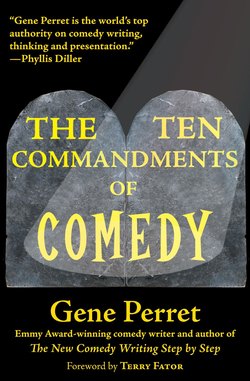Читать книгу The Ten Commandments of Comedy - Gene Perret - Страница 5
На сайте Литреса книга снята с продажи.
ОглавлениеFOREWORD
Not long after I started doing ventriloquism, I wrote my first comedy bit; it was a little routine with my new puppet and I performed it for my family. After I finished my father told me that my patter was terrible and that I just couldn’t write comedy so I should stick to “routine books” and not try to write my own material. I was 10 years old. This proves once and for all that comedy does, indeed, come from pain.
Despite that setback, I persevered and went out and performed through my teenage years and through college. I’ll never forget a time in my early 20s—I was in the middle of a show when there was a sudden, loud noise in the back of the room, surprising everyone. I tried to ad lib, but failed to get a laugh. Nothing. Nada. Crickets. I believe the Yiddish word is “bubkes.” It just brought back what my father had told me—I wasn’t funny on my own so I shouldn’t even try.
Now the good part. In my mid-20s my luck changed dramatically when I stumbled on a little book in my local library written by Gene Perret called Comedy Writing Step by Step (since updated to The New Comedy Writing Step by Step). I checked it out and devoured it eagerly, trying to find out if I had the knack to write my own material. I read and reread it from cover to cover, taking each step very seriously, working on every exercise Gene recommended.
I clearly remember the first joke I ever wrote while working through one of Gene’s comedy writing exercises. I wanted to write jokes about marriage for my puppet, Walter T. Airdale. The joke went like this:
TERRY: So Walter, I understand your anniversary was last week.
WALTER: Yep, it sure was. It was our iron anniversary.
TERRY: Which anniversary is that?
WALTER: I forgot our anniversary and she hit me with an iron!
Not a great joke, but it was life-changing for me. With that one joke I realized that I had the ability to write my own material! I kept at it; I would use Gene’s book as my comedy bible and do the exercises constantly. As a result, two things happened. The jokes started to flow faster and faster, while the enormous emotional brakes my father had put me under began to disappear. I could write a funny joke!
A few years and much hard work later that joke-writing confidence and ability enabled me to ad-lib as well, always getting a laugh when the unexpected happened during my show. And it all came from my hard work and dedication to the principles Gene had laid down in his books.
Gene’s new book, The Ten Commandments of Comedy, ties together all the lessons I learned from his past books and workshops. It’s an amazing tool that contains the main rules of comedy for anyone who wants to make a career as a comedy writer, performer, public speaker, or even for someone who just wants to be funnier in living rooms. Regardless of which describes who you are, you should read and review this book regularly.
I am living proof that these rules and principles work, because decades after that fateful day when I discovered and read that book by Gene Perret, I won America’s Got Talent and now am the headliner in my own theater at the Mirage in Las Vegas.
Thanks, Gene! I hope this in some small way lets you know how much your teachings changed my life. And for all of you who are starting to fulfill you own dream by reading The Ten Commandments of Comedy—good luck! You are Luke Skywalker about to be taught by the Jedi master Yoda of comedy writing: Gene Perret.
—Terry Fator
